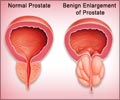The use of drugs to cure an enlarged prostate was reviewed in a recent study. Drugs belonging to the group called alpha blockers definitely have the upper hand. The use of Complementary and alternative medicine requires further research.
Benign prostatic hyperplasia (BPH) is a condition where the prostate enlarges and compresses the urinary outlet or urethra. The prostate is a gland in males that surrounds the upper part of the urethra. Increase in size of the prostate often occurs in older ages resulting in obstruction to the flow of urine. The patient complains of symptoms like increased frequency of urination during the day as well as night, weak or interrupted stream, increased urgency and need to strain to begin urination. He may feel that he has not emptied his bladder completely after urinating. Untreated BPH could give rise to complications like repeated infections, bladder stone formation and kidney damage.A recent article published in the US Pharmacist reviewed the use of drugs in treatment of BPH. According to the authors, treatment of mild-to moderate BPH can be delayed and the patient observed for some time. If symptoms progress, the patient should be prescribed drugs belonging to the selective alpha-1 adrenergic receptor antagonist (also known as selective alpha-1 blockers) group. These include alfuzosin, doxazosin, silodosin, tamsulosin, and terazosin. These drugs relax the smooth muscles of the prostate and relieve obstruction. Alfuzosin, doxazosin, terazosin could cause a decrease in blood pressure as a side effect. Alfuzosin, tamsulosin and silodosin have been associated with abnormal ejaculation. All the drugs from this group cause dizziness. Tamsulosin is associated with a rare complication during cataract surgery called intraoperative floppy iris syndrome. The alpha blockers could interact with the patient’s current medications; this should be taken into consideration before prescribing the drugs.
If BPH symptoms continue to progresses despite treatment with an alpha blocker or the patient does not tolerate the drug, drugs belonging to 5 – alpha reductase inhibitor group like dutasteride and finasteride may be added or substituted. These drugs act at the level of hormone production and reduce the proliferative action of androgens on the prostate. They require a longer time to show an effect; thus treatment should be continued at least for 6 months before reassessing the effect on the patient. Side effects include decreased libido, decreased semen quantity during ejaculation, impotence and rarely gynecomastia or development of breasts in males.
Good results have been noted when alpha blockers have been combined with 5-alpha reductase inhibitors to treat BPH.
Studies also indicate that tolterodine belonging to the anticholinergic group of drugs provides good results when used in combination with alpha blockers. This drug acts by relaxing the bladder and thus reducing spasm. It causes side effects like dry mouth and urinary retention.
Though complementary and alternative medicine (CAM) remedies are not recommended, one product called saw palmetto has shown some promise in initial studies. Further studies are required to establish its role in BPH.
Reference:
Source-Medindia










